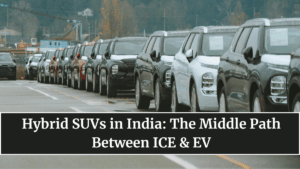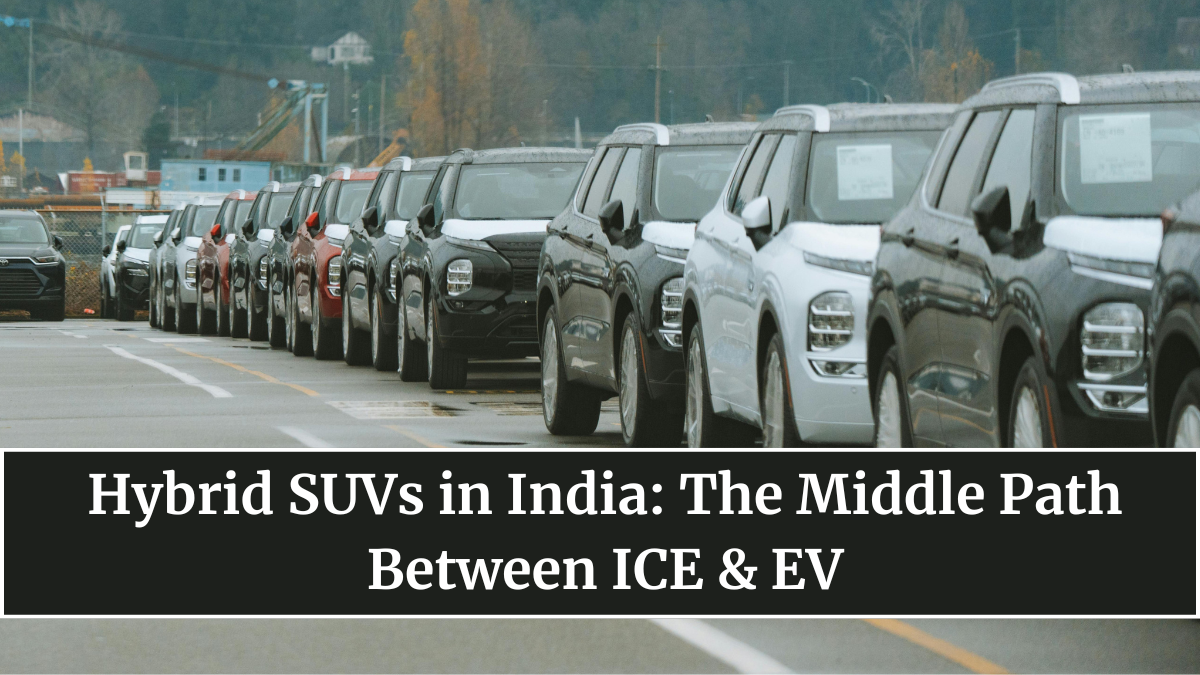India’s automotive market is experiencing a quiet but powerful shift. While the spotlight often shines on electric vehicles, hybrid SUVs in India are fast becoming the practical choice for buyers who want fuel efficiency without range anxiety. Positioned between traditional ICE (Internal Combustion Engine) vehicles and fully electric cars, these SUVs offer the best of both worlds — power, economy, and eco-conscious driving.
As Indian cities push for cleaner air and fuel costs continue to rise, hybrid technology is emerging as the ideal middle path — one that doesn’t compromise on performance or convenience.

Why Hybrid SUVs Are Gaining Popularity
Hybrid SUVs have struck the perfect balance between innovation and practicality. They appeal to a large segment of Indian buyers who are not yet ready for full EVs due to charging limitations or high costs.
Key reasons behind their rapid rise include:
-
No charging dependency: Hybrids charge themselves using regenerative braking and engine power.
-
Improved mileage: Fuel efficiency can increase by 20–30% compared to petrol SUVs.
-
Lower emissions: They cut carbon output significantly compared to ICE vehicles.
-
Smooth drive quality: Electric assist ensures instant torque and quiet acceleration.
-
Government incentives: Several states are offering tax reductions or lower registration fees for hybrid models.
This technology fits perfectly in India’s transition phase — addressing both sustainability goals and buyer convenience.
Leading Hybrid SUV Models in India
Automakers are responding to the growing demand with strong hybrid offerings across multiple price segments.
| Model | Engine Type | Mileage | Key Features |
|---|---|---|---|
| Toyota Urban Cruiser Hyryder | 1.5L strong hybrid | 27.9 km/l | e-Drive tech, EV mode, regenerative braking |
| Maruti Suzuki Grand Vitara Hybrid | 1.5L hybrid | 27.9 km/l | Dual powertrain, panoramic sunroof, ADAS features |
| Honda Elevate Hybrid (expected 2025) | e:HEV system | 26 km/l (est.) | Compact design, advanced driver assist |
| Lexus NX 350h | 2.5L hybrid | 17 km/l | Luxury performance with EV-grade silence |
| Toyota Innova Hycross | 2.0L strong hybrid | 23.2 km/l | Family SUV with fuel efficiency and comfort |
These models prove that hybrid SUVs aren’t just a stopgap — they’re here to stay and appeal to both family buyers and eco-conscious professionals.
The Technology Powering Hybrid SUVs
Hybrid SUVs combine internal combustion engines with electric motors, intelligently switching between or combining both for optimal performance.
There are two main types:
-
Mild Hybrids: Assist the engine but can’t run purely on electric power.
-
Strong Hybrids: Capable of short EV-only drives and improved mileage.
They use regenerative braking, which captures energy lost during braking and stores it in the battery for future use. The system automatically decides when to switch between power sources, ensuring seamless transitions and maximum fuel efficiency.
The Growing Market & Consumer Sentiment
According to auto industry data, hybrid vehicle sales in India grew over 80% in 2024, with SUVs leading the charge. Major cities like Delhi, Pune, and Hyderabad have seen a spike in hybrid registrations thanks to eco-conscious consumers and corporate fleet buyers.
Buyers cite key motivations such as:
-
Lower long-term running costs.
-
Freedom from charging infrastructure limitations.
-
Cleaner energy transition before moving to full EVs.
The growing acceptance of hybrid SUVs suggests a two-step journey toward electrification, rather than an overnight shift.
Challenges in Hybrid SUV Adoption
Despite their benefits, hybrid SUVs still face a few roadblocks:
-
Higher upfront cost: Strong hybrids can cost ₹2–3 lakh more than ICE variants.
-
Limited models: Only a few brands currently offer strong hybrid options.
-
Tax structure: Hybrids attract higher GST (43%) compared to EVs (5%), reducing their affordability.
-
Public awareness: Many consumers still confuse hybrids with EVs or plug-in hybrids.
To unlock their full potential, policy adjustments and broader awareness campaigns are needed.
The Future of Hybrid Mobility in India
Hybrid SUVs are expected to dominate India’s mid-range auto segment over the next three years. Automakers like Toyota, Maruti Suzuki, Honda, and Hyundai are already developing new hybrid platforms tailored to Indian conditions.
By 2027, hybrid technology could become standard across top-selling SUV categories, bridging the gap between ICE and electric cars. With improving fuel efficiency and smart engine management systems, hybrids are proving to be the bridge that carries India into an electrified future — one efficient mile at a time.
FAQs
What is a hybrid SUV?
A hybrid SUV combines an internal combustion engine with an electric motor to improve fuel efficiency and reduce emissions.
Are hybrid SUVs better than electric cars?
They offer a practical alternative — providing efficiency without charging limitations, ideal for areas lacking EV infrastructure.
Which are the best hybrid SUVs in India?
Top models include the Toyota Hyryder, Maruti Grand Vitara, and Toyota Innova Hycross.
Do hybrid SUVs need to be charged?
No, they charge automatically using the engine and regenerative braking.
What’s the future of hybrid SUVs in India?
With increasing adoption and more model launches expected, hybrid SUVs will play a key role in India’s transition to clean mobility by 2030.
Click here to know more.
